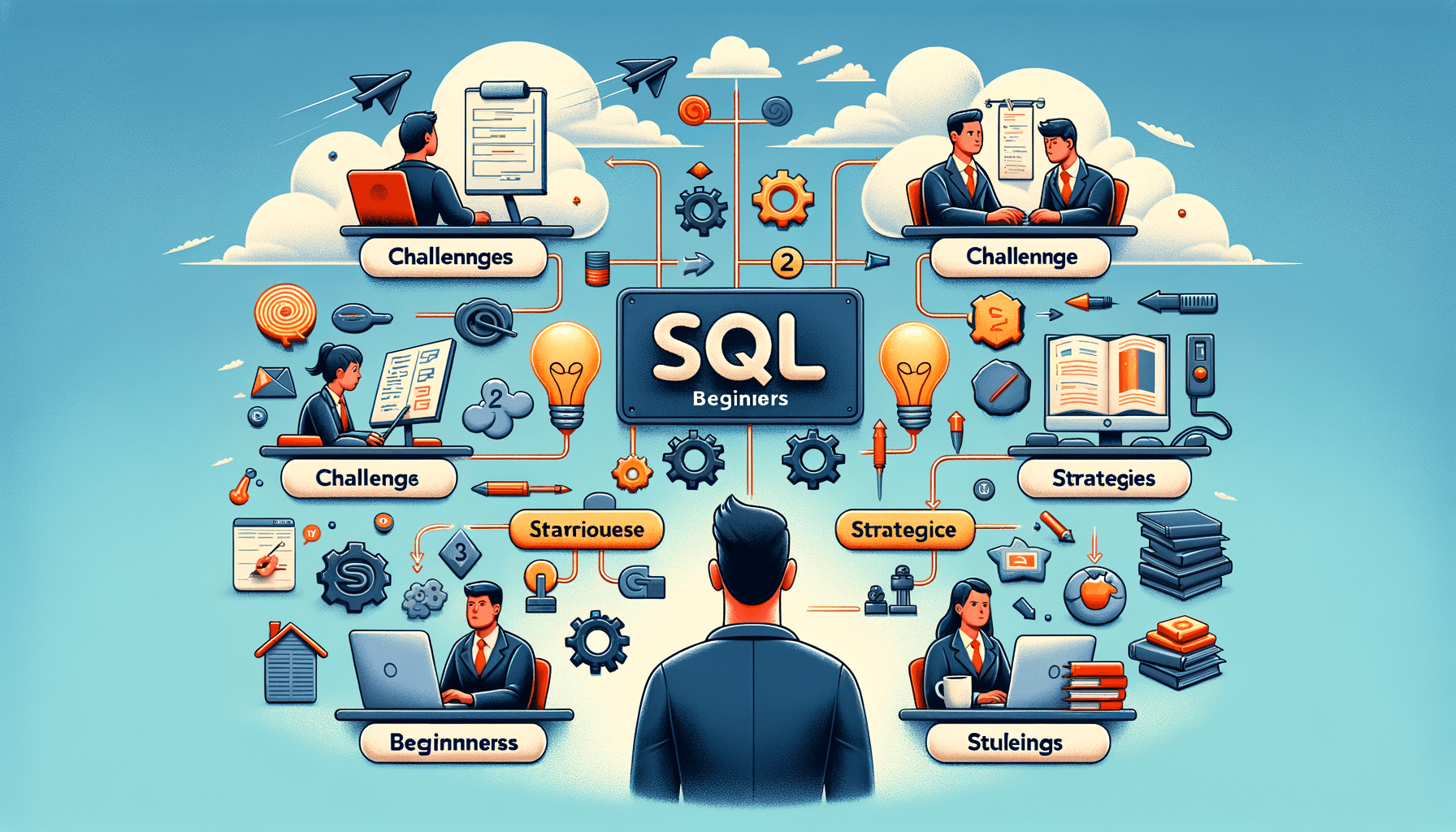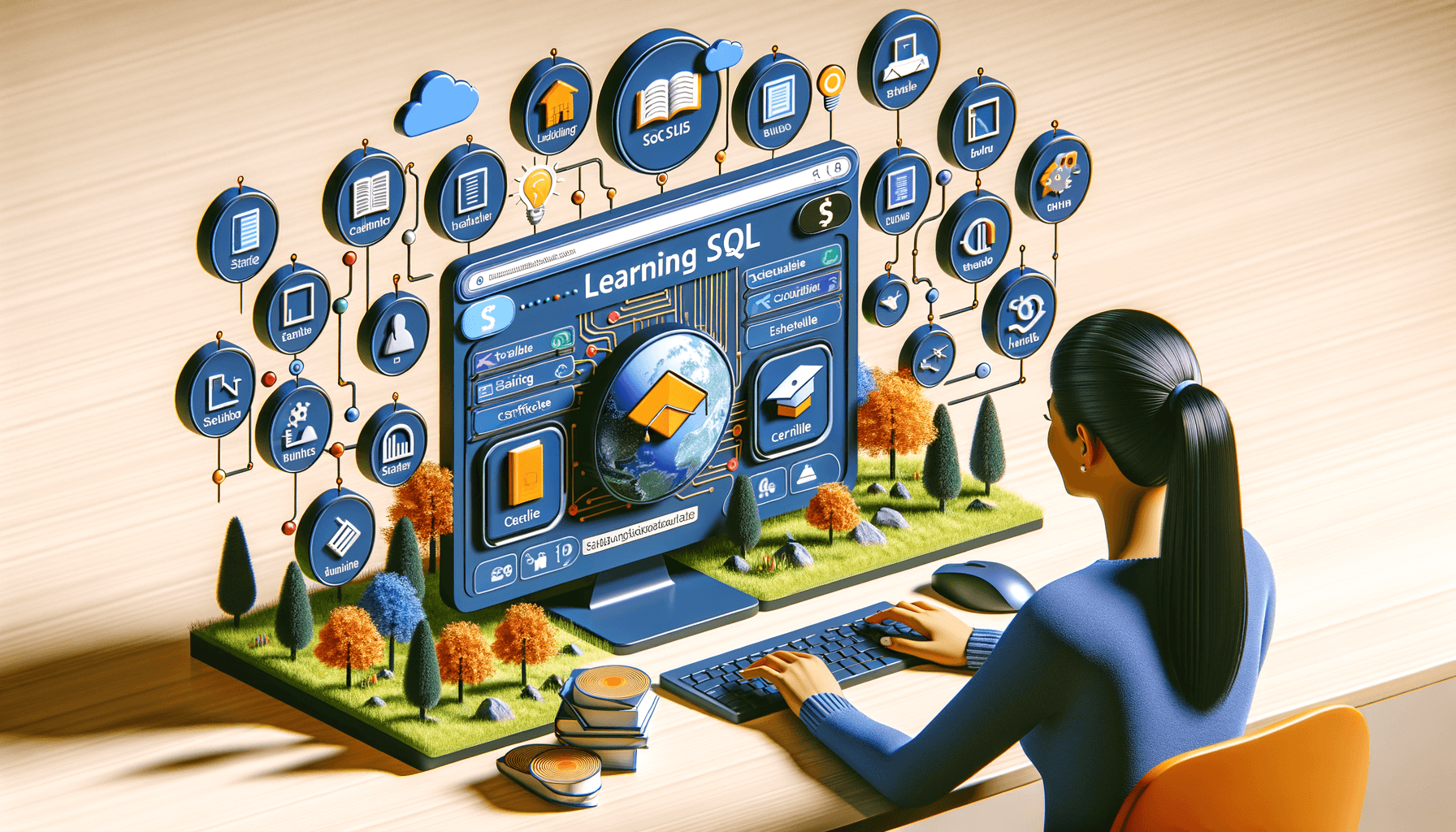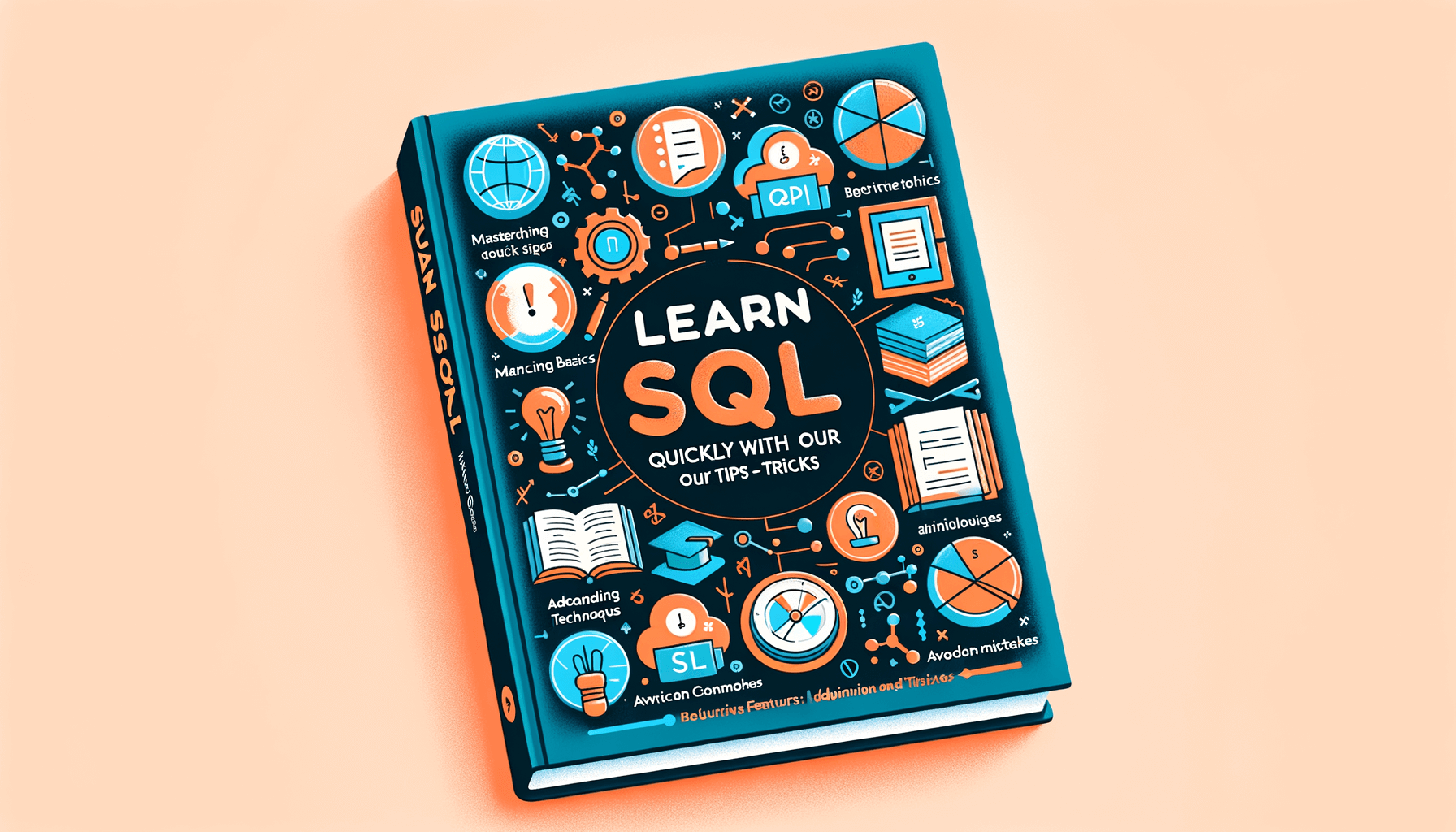A big variety of articles and resources

Is It Hard to Learn SQL? Tips and Tricks for Beginners
 Sia Author and Instructor
Learn SQL
Sia Author and Instructor
Learn SQL
9 minute read
Learning SQL might seem tough at first, but with the right approach, anyone can get the hang of it. SQL is a key skill for managing and analyzing data, making it super valuable in today's tech-driven world. This article will walk you through the basics, common challenges, and some handy tips to make learning SQL easier. We'll also look at the tools you'll need and the cool things you can do once you're good at it.
Key Takeaways
- SQL is essential for managing and analyzing data.
- Beginners often struggle with syntax, joins, and debugging.
- Using online resources and practicing with projects can boost your learning.
- There are many tools and software to help you learn SQL effectively.
- SQL skills are useful in many fields like business, web development, and data science.
Understanding the Basics of SQL
What is SQL?
SQL, or Structured Query Language, is a standard language used to communicate with databases. It allows us to create, read, update, and delete data stored in a database. SQL is essential for managing and manipulating data efficiently. Whether you're working with small datasets or large-scale databases, SQL provides the tools needed to handle data effectively.
Core Concepts and Terminology
To get started with SQL, it's important to understand some core concepts and terminology:
- Tables: Structures that store data in rows and columns.
- Queries: Commands used to retrieve data from tables.
- Primary Key: A unique identifier for each record in a table.
- Foreign Key: A field in one table that links to the primary key in another table.
- Index: A performance optimization feature that speeds up data retrieval.
Importance of SQL in Data Management
SQL plays a crucial role in data management. It allows us to organize and analyze data, making it easier to draw insights and make informed decisions. In today's data-driven world, having a good grasp of SQL is invaluable. It is widely used in various fields, including business intelligence, web development, and data science.
Mastering the basics of SQL opens up numerous opportunities in the tech industry. It is a foundational skill that can lead to more advanced data management and analysis techniques.
Common Challenges Faced by SQL Beginners
Syntax and Query Structure
One of the first hurdles beginners face is understanding the syntax and structure of SQL queries. Learning the correct order of SQL commands can be confusing at first. For example, knowing when to use SELECT, FROM, WHERE, and other clauses in the right sequence is crucial. This can be especially tricky when dealing with more complex queries.
Understanding Joins and Subqueries
Another common challenge is mastering joins and subqueries. These concepts are essential for combining data from multiple tables. Beginners often struggle with the different types of joins, such as INNER JOIN, LEFT JOIN, and RIGHT JOIN. Subqueries, or queries within queries, can also be difficult to grasp initially.
Debugging and Error Handling
Debugging SQL queries and handling errors is another area where beginners often face difficulties. SQL error messages can be cryptic and hard to understand. Learning how to read these messages and identify the source of the problem is a skill that takes time to develop. It's important to practice and not get discouraged by initial failures.
Remember, mastering SQL takes time and practice. Don't be afraid to make mistakes and learn from them. With persistence, you'll get better at writing efficient and error-free queries.
Effective Learning Strategies for SQL
Utilizing Online Resources and Tutorials
To start learning SQL, we should take advantage of the many online resources and tutorials available. Websites like Codecademy, Khan Academy, and W3Schools offer interactive lessons that make learning fun and engaging. These platforms often provide step-by-step instructions, which can help us understand the basics quickly. Additionally, many of these resources are free, making them accessible to everyone.
Hands-On Practice and Projects
One of the best ways to learn SQL is by doing. We should create our own projects or contribute to existing ones. This hands-on experience helps us apply what we've learned and see how SQL works in real-world scenarios. For example, we could set up a small database for a personal project or participate in coding challenges on websites like LeetCode or HackerRank.
Joining SQL Communities and Forums
Being part of a community can greatly enhance our learning experience. Online forums and communities like Stack Overflow, Reddit, and SQLServerCentral allow us to ask questions, share knowledge, and learn from others' experiences. Engaging with these communities can provide us with valuable insights and tips that we might not find in textbooks or tutorials.
Learning SQL is a journey that requires patience and practice. By using online resources, engaging in hands-on projects, and participating in communities, we can make this journey more enjoyable and effective.
Essential Tools and Software for SQL Learners
Popular SQL Database Systems
When starting with SQL, it's crucial to choose the right database system. Some of the most popular options include MySQL, PostgreSQL, and SQLite. Each of these systems has its own strengths and is widely used in the industry. MySQL is known for its speed and reliability, while PostgreSQL is praised for its advanced features and compliance with standards. SQLite is a lightweight option, perfect for beginners and small projects.
SQL Editors and Integrated Development Environments (IDEs)
Using a good SQL editor or IDE can make learning SQL much easier. Tools like SQL Server Management Studio (SSMS), DBeaver, and DataGrip offer features like syntax highlighting, code completion, and debugging support. These tools help us write and test our queries more efficiently. For beginners, starting with a user-friendly editor can make a big difference in understanding SQL concepts.
Version Control and Collaboration Tools
As we progress in our SQL learning journey, version control and collaboration tools become essential. Git is a popular version control system that helps us keep track of changes in our SQL scripts. Platforms like GitHub and GitLab allow us to collaborate with others, share our work, and contribute to projects. Using these tools not only improves our workflow but also prepares us for real-world scenarios where teamwork is key.
Embracing these tools and software early on can significantly enhance our SQL learning experience, making it more structured and efficient.
Advanced Topics to Explore After Mastering the Basics
Performance Tuning and Optimization
Once we've got the basics down, it's time to make our SQL queries run faster. Performance tuning is all about finding ways to speed up our database operations. This can involve indexing, query optimization, and understanding execution plans. By focusing on these areas, we can make sure our databases are running as efficiently as possible.
Advanced Query Techniques
After mastering simple queries, we can dive into more complex ones. Advanced query techniques include using window functions, common table expressions (CTEs), and recursive queries. These tools allow us to perform more sophisticated data analysis and manipulation, making our SQL skills even more powerful.
Data Security and Compliance
In today's world, keeping data safe is crucial. Learning about data security and compliance helps us protect sensitive information and follow legal requirements. This includes understanding encryption, access controls, and data masking. By mastering these topics, we can ensure our databases are secure and compliant with regulations.
Exploring these advanced topics not only enhances our SQL skills but also prepares us for real-world challenges in data management. By continuing to learn and adapt, we can stay ahead in the ever-evolving field of database technology.
Real-World Applications of SQL Skills
SQL in Business Intelligence and Analytics
SQL is a powerful tool in the world of business intelligence and analytics. It allows us to extract and analyze data from large databases, helping businesses make informed decisions. By mastering SQL, we can turn raw data into meaningful insights that drive strategy and growth.
SQL for Web Development
In web development, SQL is essential for managing databases that store user information, content, and other critical data. We use SQL to create, read, update, and delete data in web applications. This ensures that our websites are dynamic and interactive, providing a better user experience.
SQL in Data Science and Machine Learning
SQL plays a crucial role in data science and machine learning. It helps us handle large datasets, perform complex queries, and prepare data for analysis. With SQL, we can efficiently manage and manipulate data, making it easier to build and train machine learning models.
The Zero to PostgreSQL Junior DBA course offers practical SQL training with real-world problem-solving, hands-on projects, and expert guidance. Instructor Eric Vanier brings 25 years of experience in optimizing databases.
SQL skills are used in many real-world situations, from managing databases in businesses to analyzing data in research. If you want to learn more about how SQL can help you in your career, check out our courses. We offer lessons that are easy to follow and perfect for beginners. Visit our website today to get started!
Conclusion
Learning SQL might seem tough at first, but with the right approach, it becomes much easier. Start with the basics and practice regularly. Use online resources and join study groups to get help when you need it. Remember, everyone learns at their own pace, so don't rush. With patience and persistence, you'll soon be able to use SQL confidently. Keep practicing, and you'll see improvement over time.
Frequently Asked Questions
What is SQL and why should I learn it?
SQL stands for Structured Query Language. It's used to manage and manipulate databases. Learning SQL is important because it's a key skill for data management and is widely used in various fields like business, web development, and data science.
Is SQL hard to learn for beginners?
SQL can be challenging at first, especially when learning the syntax and how queries work. However, with practice and the right resources, many beginners find it manageable.
What are some common mistakes beginners make with SQL?
Common mistakes include not understanding the correct query structure, misusing joins, and not properly handling errors. It's important to practice and learn from these mistakes.
How long does it take to learn SQL?
The time it takes to learn SQL varies for everyone. Some people might grasp the basics in a few weeks, while others might take a few months. Consistent practice can speed up the learning process.
What resources can I use to learn SQL?
There are many resources available for learning SQL, including online tutorials, courses, books, and community forums. Hands-on practice with real projects can also be very helpful.
Can learning SQL help me get a job?
Yes, knowing SQL can be a valuable skill for many jobs, especially in fields like data analysis, business intelligence, and software development. Many employers look for candidates with SQL knowledge.
Related Articles

Can I learn SQL fast enough to get a job next week using it?
12 minute read

Discover the Best Website to Learn SQL in 2023
9 minute read





